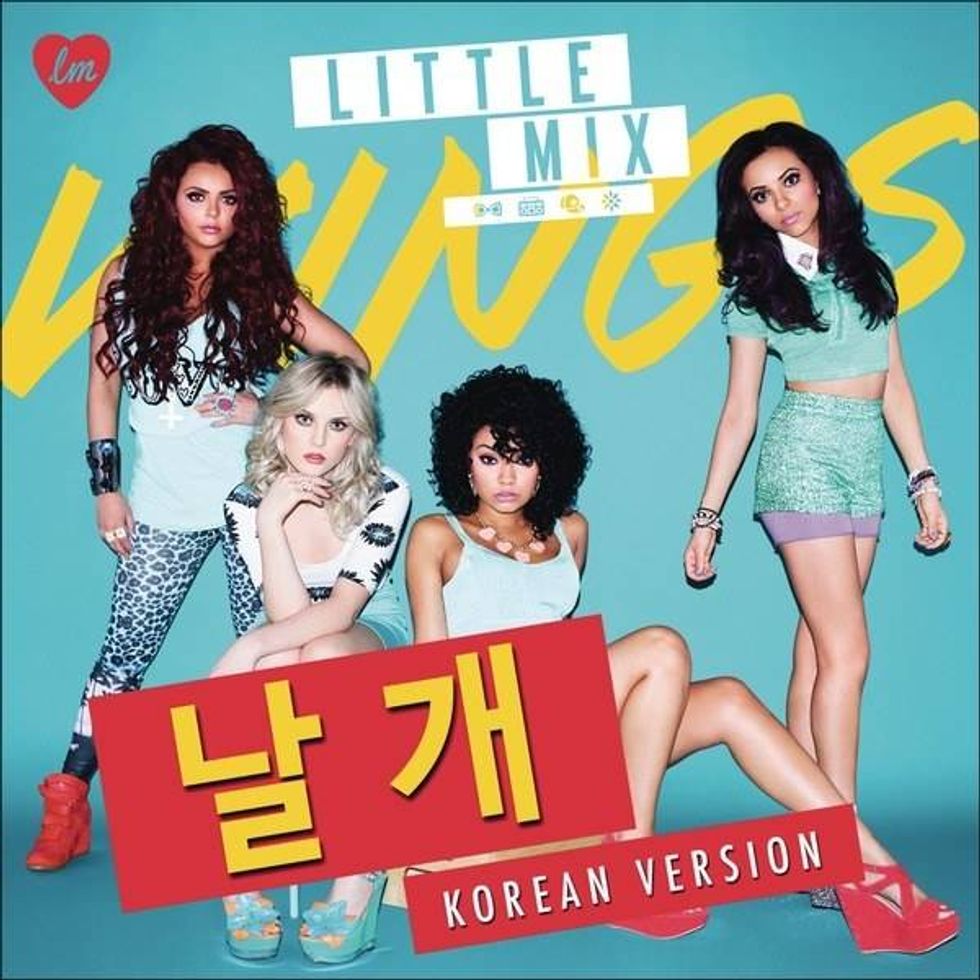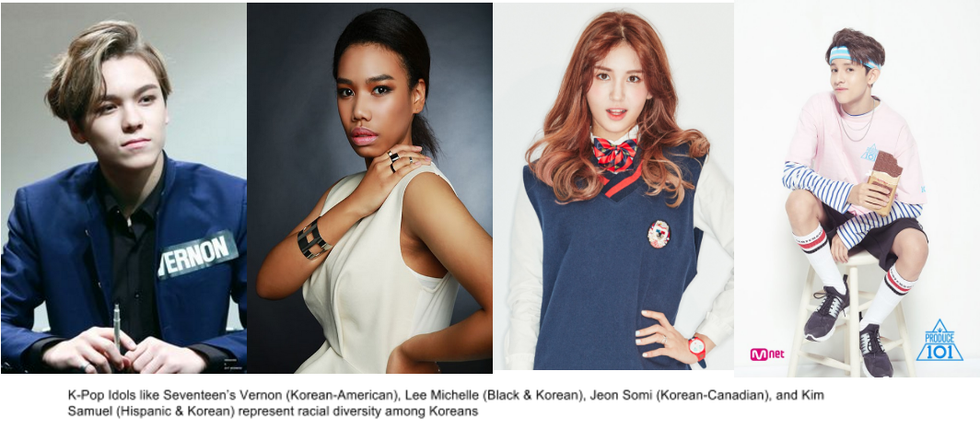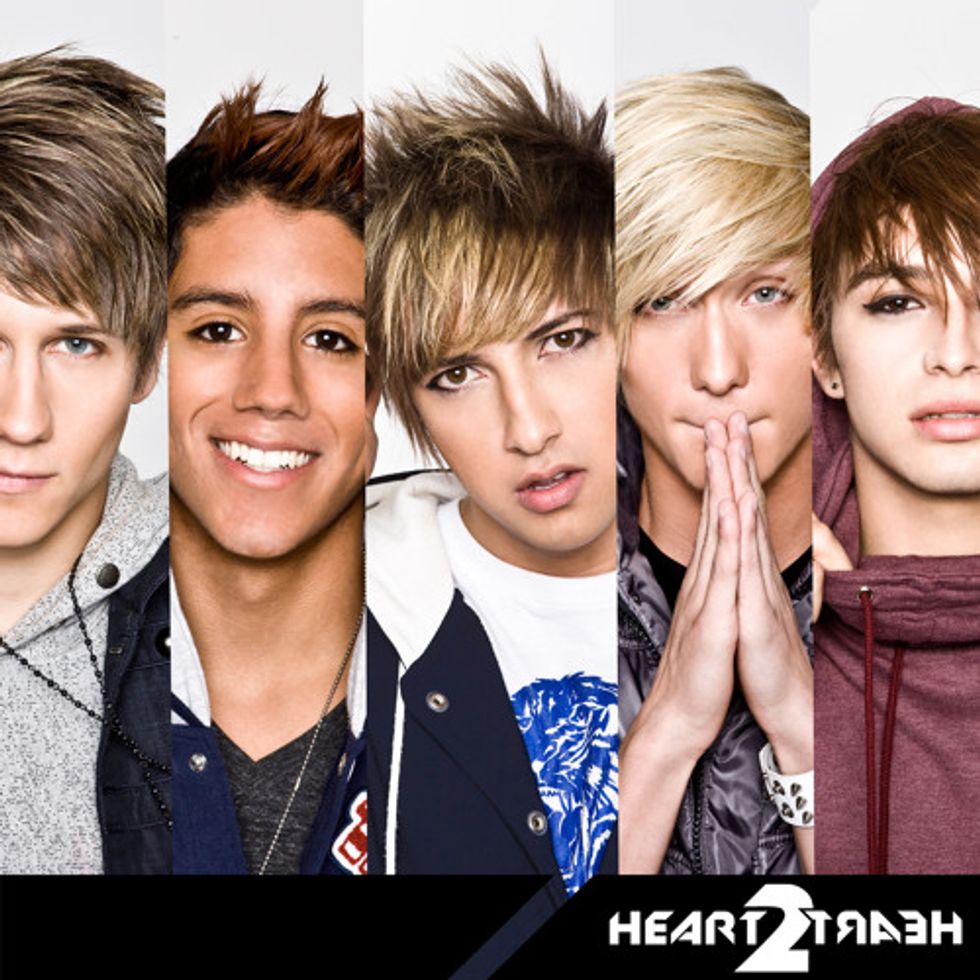EXP Edition, the “first non-Korean K-Pop group,” released a video teaser for their upcoming single, “Feel Like This,” and K-Pop fans and the media went wild. This isn’t the first time the boy group stirred up controversy as their debut announcement alone from last year caused major discourse. Revealed to be a Columbia graduate student’s experiment, EXP has definitely brought some burning questions that need to be addressed such as what makes a K-pop group? How much does race and ethnicity play in music genres? And most importantly, why are there white people in a group claiming to be a K-pop group?
Who is EXP Edition?
EXP Edition debuted in 2016 with their song “LUV/WRONG” originally with six members. The song was tolerable however the music video was not the best quality and appeared more like a skit satirizing the stereotypical, quirky visuals of K-Pop music videos. The group formed in 2014 in New York City by Columbia University graduate student, Bora Kim, and her two project partners, Karin Kuroda and Samantha Shao, as part of their thesis project — titled “I’m Making a Boy Band” (IMABB) — to examine how gender is performed in pop culture and how it relates to other issues in globalized society. Through EXP, Kim aims to create a “dialogue of cultural appropriation” as well as the “change in perception of Asian masculinity.” Now the group consists of four members--Frankie, Koki, Hunter, and Sime--who continue on with their journey to become K-Pop idols as the boys recently traveled to South Korea to learn more about the language and culture, in addition to solidifying their K-Pop idols status by booking interviews, radio shows, performances, and even a variety show. And since EXP Edition is an EXPeriment, they shouldn’t be taken seriously as a K-Pop group, which is why many predict they won’t make it far in the K-Pop market. However, this project group brought into light an important discussion that needs to be addressed about this “non-Korean K-Pop group” labeling themselves as a K-Pop group; a discussion that goes beyond K-Pop as just a music genre.
Why EXP Is Not A K-Pop Group & Why It's More Than Just A Music Genre
Another factor that Kim wishes to examine through her boy band is identifying the influence of American music in K-Pop and observe how EXP will infuse different American music genres when producing K-Pop music. However, since the news of EXP many K-Pop and non-K-Pop fans voiced their opinion of this American K-Pop group and why K-Pop is more than just a music genre that anyone thinks they can make it big in the industry.
1. “But It's Just A Language!”
A good point to make in defending EXP as a K-Pop group, yet the members are barely learning the basics of Korean and when they sing in Korean, they don’t sing in a clear and smooth manner that makes the Korean language sound as beautiful as melodies. They sound choppy and as if they’re reading straight from a script so we can only hope their Korean pronunciation skills will improve over time because this won’t definitely appeal in the Korean market. Second, singing in a different language doesn’t solidify one’s music genre. Little Mix’s Korean version of "Wings" doesn’t make them K-Pop artists. The Jonas Brothers’ Japanese song, “Infatuation” didn’t make them official J-Pop artists. And Selena Gomez’s several Spanish versions of her English singles doesn’t label her as a Latina artist despite being Latina. I do highly encourage more artists to produce multilingual versions of their singles to acknowledge international fans, but this supports that music genres--especially ethnic music genres--are more than just trying to fit a particular sound and involves a culture and experience. So just as how Iggy Azalea tried to prove herself as a rapper (and failed), EXP won’t be able to convince the public that they’re a K-Pop group with the lack of experience of the K-Pop industry.
2. “K-Pop Needs More Diversity!”
To some extent I agree with this statement, however, I don’t think adding white people to K-Pop (or anything in general) would be considered as diversity; in fact, the reason diversity isn’t needed is because K-Pop is used as a form of Asian representation from an American perspective. I dare you to name a popular, successful, and current Asian-American singer in the United States. The only ones that come to mind are Far East Movement (who haven’t been heard in awhile), Steve Aoki (who appeals more to EDM fans rather than the public), and Bruno Mars who’s half-Filipino (however, his Asian heritage isn’t mentioned enough). Having very few Asian artists in the music industry with not enough public recognition discourages diversity in the music industry as it perpetuates the stereotype that Asians don’t pursue careers in music (unless classical music) which then discourages Asian-Americans in pursuing careers in the fine arts. Of course, K-Pop doesn’t represent all Asians and definitely does not represent Koreans and Korean music; however, the Hallyu Wave influenced large international fan bases who have grown to appreciate Korean culture through Korean Pop music. As a result, K-Pop music served as a stepping stone for international audiences to appreciate more ethnic media, despite language and cultural differences, and recognize Asians as musical artists, performers, and entertainers. So if EXP actually did promote as an American boy band, their Asian-American member, Koki, would provide some representation, but as a K-Pop group they wouldn’t exactly be considered as a diverse group. There’re no white K-Pop artists because White artists can prosper in the American music industry, versus a Korean artist establishing a music career in the U.S. who has a very slim chance. In recent years, K-Pop groups have been increasing in diversity: first with Korean-American Idols (United States & Canada), then idols from East (China, Taiwan, and Japan) and Southeast Asia (Thailand), and biracial/mixed race idols more recently. <INSERT PICS> Each of these types of idols represent different Asian subgroups and experiences that provide representation and establish a connection for Asian fans. Therefore, it is essential for K-Pop artists to be Asian because the music genre serves as a platform for Asian representation that is absent in U.S. media and validate the identities and passions for Asian fans.
3. “It's Just A Music Genre! Anyone Can Participate!”
Of course, it takes more for an American boy group to be singing in Korean and travel to Korea to be considered a K-Pop group. In the United States, we believe that anyone can become a singer with talent thanks to the Internet, but in South Korea's K-Pop industry, not just anyone with a desire can become a K-Pop idol. There’s an entire culture in the K-Pop industry that includes a long and tortuous process for debut. K-Pop groups are endlessly produced to the point that there’s a surplus of K-Pop groups, thus resulting in a fierce competition for trainees who dream of stardom as well as for established groups who need to maintain their relevance among the flood of new idol groups. Trainees start as young as their adolescent years to begin their training which requires much dedication in vocal practice, dance rehearsals, interview simulations, image management, language classes and more tedious but essential training courses in addition to maintaining their academic life while also restricting their personal life (no dating or any activities that would harm their attractive idol image). In short, the K-Pop industry is harsh and requires a strong mentality to conquer as exemplified by an interview with Melanie Lee. The former member of Chocolat commented how training in the K-Pop industry was detrimental to her mental health as she self-harmed herself at a young age as a result to the pressure of fulfilling the ideal idol image. Lee also revealed that she only earned $12 total throughout her years as a Chocolat member which expresses the financial struggles trainees and idols encounter when they don’t reach sufficient album sales to receive income and pay off their trainee debt. In contrast, Bora Kim and EXP received their funds via Kickstarter and raised over $30,000 to support her project. It’s understanding that an academic project requires funding, however, this does not reflect the same experience aspiring K-Pop idols undergo when every day and night is spent training in the dance studio along with negative health effects and spending years paying off debt. EXP will hardly get a glimpse of the harsh realities of K-Pop when they have the funds to produce albums, music videos, and travel to South Korea for special idol training meanwhile underprivileged idols hope to make the same amount of money in album sales and pay off their debt so they can finally earn their well-deserved pay.
4. “Just Give Them A Chance!”
Considering this is a thesis project exploring the fusion of Korean Pop music and American music as well as comparing female producers and male producers in the music industry, I will keep an eye out on EXP to see how far their success will go. However, this isn’t the first non-Korean boy band that challenged the definition of a K-Pop group. Six years ago, Lance Bass — former member of NSYNC — produced five-member boy group, Heart2Heart. The boy band didn’t last past their debut song but leader and producer of the group, “Chad Future,” made his solo debut and elongated his fame with English covers of Korean songs, and original Korean songs produced by himself. Yet his career wouldn’t have lasted as long without his collaboration work with K-Pop idols like f(x)’s Amber and VIXX’s Ravi to which he took to his advantage to milk from their fans and make enough money to retire from the K-Pop industry and fund his music career as David Lehre of F.A.M.E. in the U.S. music industry. I can’t make comparisons yet since EXP are still a work in progress, but Heart2Heart had a big advantage being produced by a boy band legend as well as K-Pop idol collabs to milk from, but even then Heart2Heart and Chad Future were not popular in South Korea, the K-Pop industry, nor among K-Pop fans since they were never recognized as K-Pop group in the first place. If Heart2Heart couldn’t succeed with these advantages, how would EXP?
There are many factors supporting the failure of EXP Edition being recognized as a K-Pop group largely because they cannot emulate the same characteristics that make K-Pop a distinguished genre. The creation of EXP Edition also displays the increased popularity of the music genre since the advent of the Hallyu Wave in 2011 and how marketable the music industry has become considering how much money, time, and effort Bora Kim is willing to invest for a thesis project. With the hot discourse rising about the significance of EXP across social media and news articles, I think it’s important for Kim to note discussions of race representation, ethnic media, and the harsh lifestyle of the K-Pop industry as presented through EXP in her thesis. And despite the arguments and negative reception, EXP has gained enough recognition through online discussions. Any press is good press, right?























